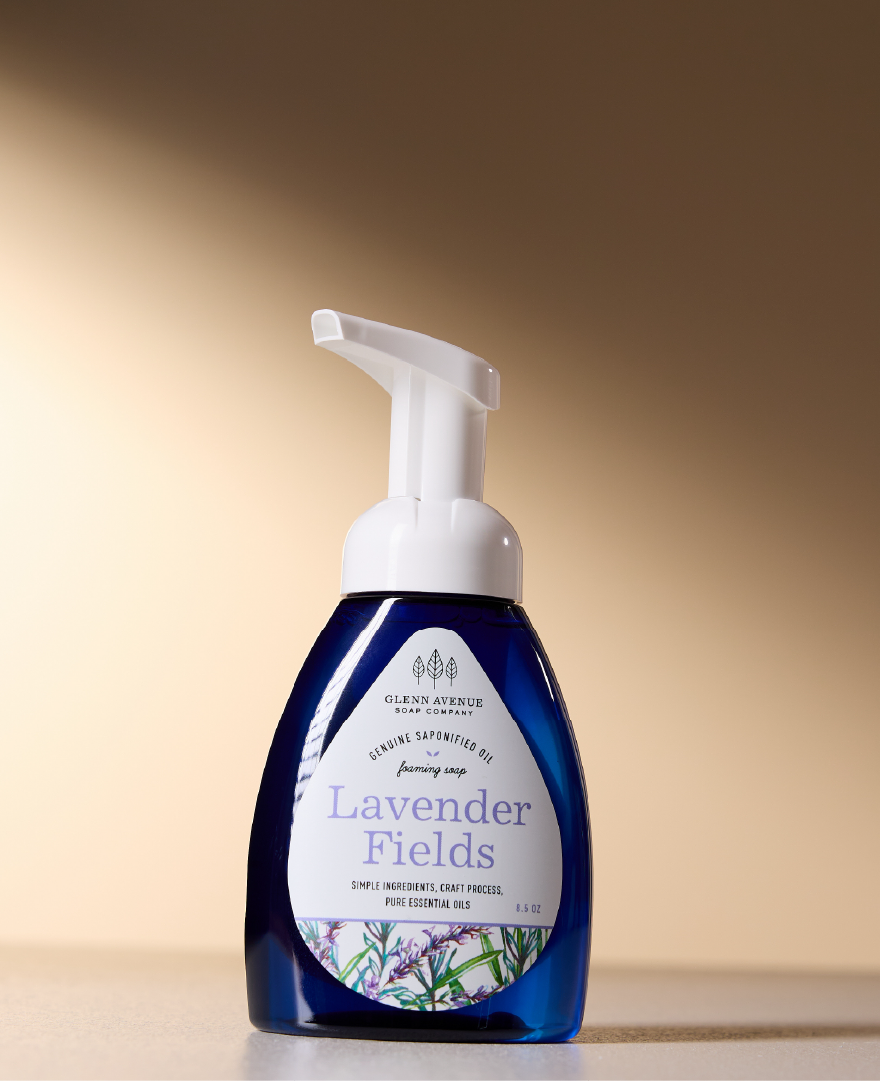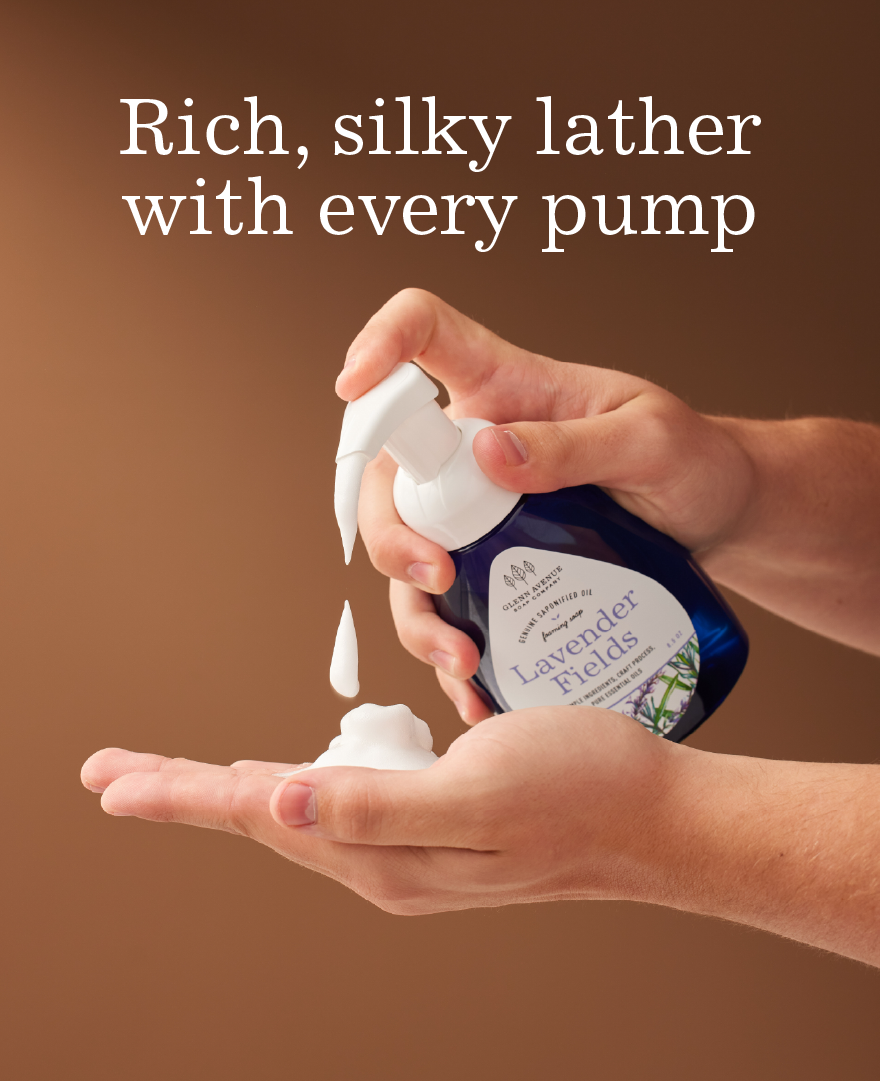WHAT IS THE DIFFERENCE BETWEEN YOUR FOAMING SOAP AND OTHER COMPANIES'?
Many commercial companies don't make foaming soaps with saponified oils, instead they use surfactants, detergents, foaming agents, artificial preservatives, and artificial fragrances, which are cheap and easy, but will leave your hands raw. While other companies use synthetic detergents and surfactants that can be skin irritants, we use saponified oils that are cleansing and moisturizing. Other companies use artificial fragrances with hidden ingredients, while we use essential oils and natural fragrances instead. And whereas other companies use artificial preservatives like methl- and propel- parabens that are known to be endocrine disruptors, our foaming soaps are all-natural and are made without the use of preservatives.Once you wash your hands with our soaps, you will *feel* why we use saponified oils rather than those ingredients - it feels like washing your hands with silk.
ARE YOUR SOAPS CASTILE SOAPS?
Yes! Historically, the term castile soap referred to soaps made from saponified olive oil (like our Simply Olive Bar Soap). However today the term refers to genuine saponified soaps that contain only vegetable oils, no animal fats. Not all castile soaps are the same - some use a different blend of oils (oils have different properties) and have different concentrations than ours. Our foaming soaps all contain saponified oils of Organic Extra Virgin Olive, Organic Coconut, and Organic Sunflower. Olive was chosen for its moisturizing stable lather, coconut for its fluffy lather, and sunflower for its stable lather, conditioning, and silky feel. While glycerin (a humectant) is a natural by-product of saponification, we've added some additional glycerin, which also helps to keep your hands moisturized.
WHAT IS SAPONIFICATION?
Saponification is the chemical reaction that produces genuine soap. Here at Glenn Ave Soap Company, we make soap the traditional way, the way our great-great-grandparents made soap. While our ancestors may have used lard and wood ash, we start with our special blend of high-quality oils. When these triglycerides are blended with water and lye (an alkaline solution – sodium hydroxide or potassium hydroxide), saponification happens. All the lye is used up and the oils are transformed into soap (fatty acid salt) and glycerin, a natural humectant that allows your skin to retain moisture.
I SEE SOMETHING IN MY FOAMING SOAP... WHAT IS IT?
When natural liquid soaps sit for a little bit, the unsaponified oils, essential oils or botanical extracts may naturally separate, forming a white-ish cloudiness at the top or wispy "floaters" throughout the bottle. We call these "precipitants". They are not contaminants, and are a normal occurrence in natural soaps, especially when working with citrus essential oils. When shaken up, these will dissolve.
WILL YOUR FOAMING SOAP WORK IN A REGULAR LIQUID SOAP DISPENSER?
The valves are different in foaming hand soap dispensers vs. regular liquid soap dispensers, so you can't just switch them out. Fortunately you can buy all our foaming soaps in a 8.5oz pump, or if you would like your soap dispenser to match your style, you can also purchase a refillable foaming hand soap glass dispenser.
WHAT IS A BETTER WAY TO KILL GERM, WASHING WITH SOAP & WATER OR USING HAND SANITIZER?
Soap molecules are amphiphilic. An amphiphile is a chemical compound possessing both hydrophilic (water-loving) and lipophilic (fat-loving) properties. One side of the molecule is hydrophilic (polar) and likes water, the other is hydrophobic (non-polar) and likes oil. Cellular membranes are also made of dual-sided molecules called lipids. Soaps do an excellent job of solvating the hydrophobic part of the lipid cell membrane, which means it dissolves the membranes of the cell, thus killing the bacteria, while the hydrophilic part of the molecule allows it to be easily washed away.
According to the CDC, "washing hands with soap and water whenever possible because handwashing reduces the amounts of all types of germs and chemicals on hands. But if soap and water are not available, using a hand sanitizer with at least 60% alcohol can help you avoid getting sick and spreading germs to others. The guidance for effective handwashing and use of hand sanitizer in community settings was developed based on data from a number of studies." We recommend having one of our foaming hand soap pumps at each sink, and a hand sanitizer in your bag and car, when you might not have access to soap and water.

























